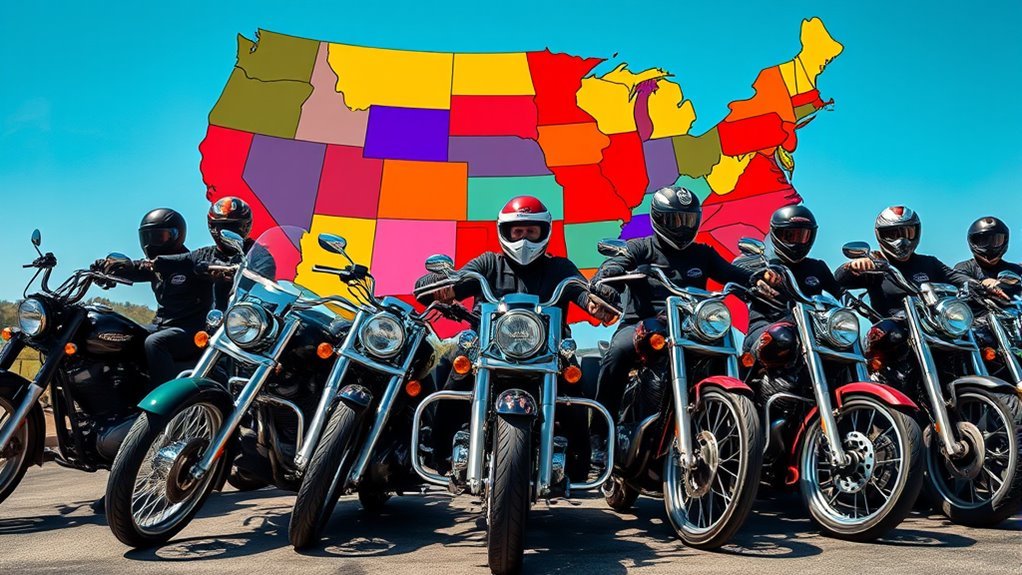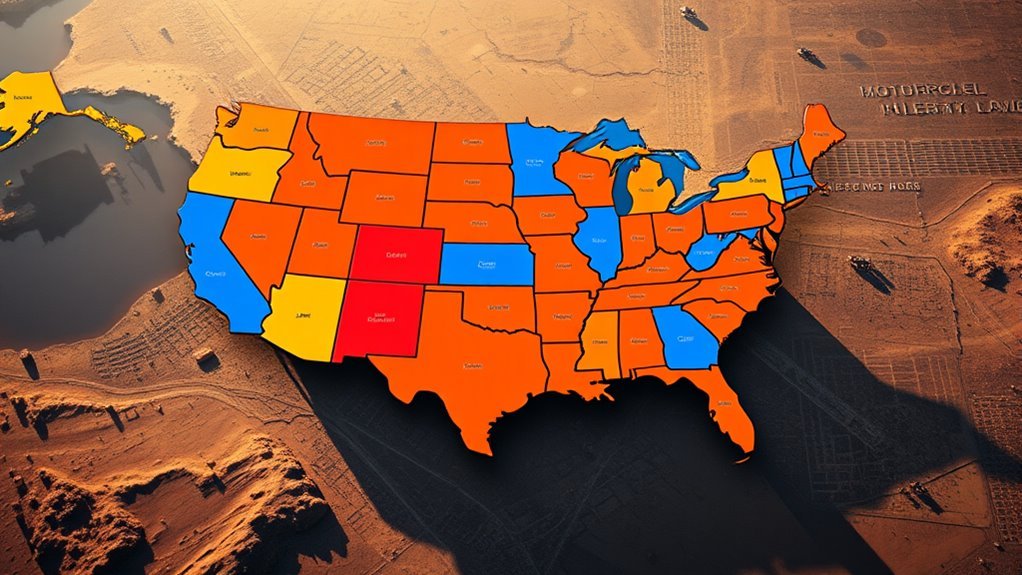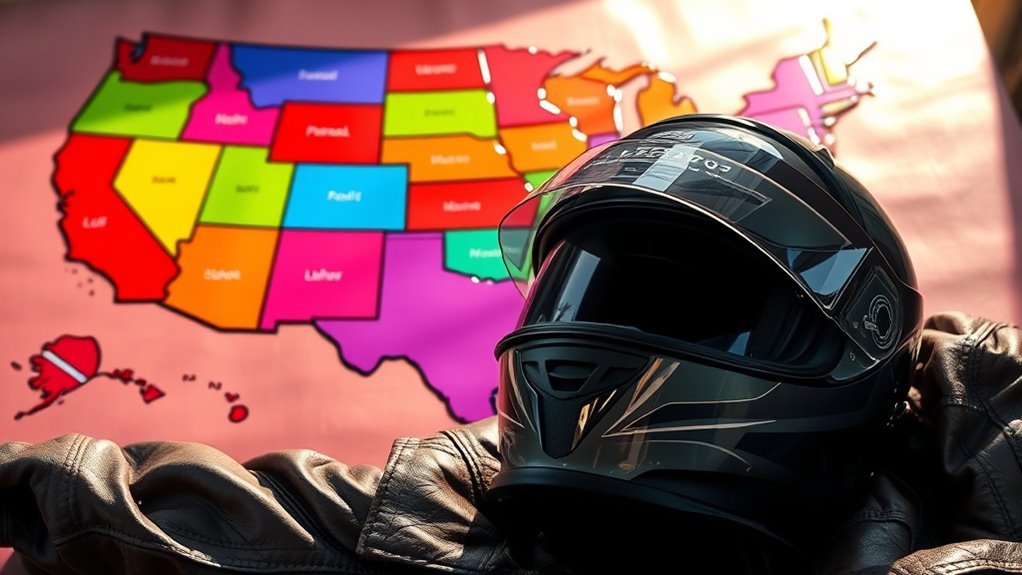Motorcycle Helmet Laws by State in the USA
Motorcycle helmet laws in the USA vary greatly. Some states mandate helmet use for all riders, known as universal laws, while others have age or experience-based partial requirements. States without helmet laws allow riders to choose, but this raises concerns about safety. Wearing a helmet greatly reduces the risk of injury. Understanding these laws and their implications is essential for all riders, and there’s more to explore about helmet safety and selection.
Overview of Helmet Laws in the USA

When you consider the diverse landscape of motorcycle helmet laws across the United States, it’s clear that regulations vary greatly from state to state. Some states mandate helmet use for all riders, while others impose restrictions only on specific age groups or experience levels. This inconsistency can impact helmet effectiveness, as research indicates that wearing a helmet markedly reduces the risk of serious injury or death in accidents. Rider statistics show that states with stringent helmet laws generally report lower fatality rates among motorcyclists. However, in states with more lenient regulations, riders often cite personal freedom as a reason for opting out of helmet use. Balancing individual choice with safety remains a contentious issue within the motorcycling community.
States With Universal Helmet Laws

Although the debate over helmet laws continues, several states have implemented universal helmet laws that require all motorcyclists to wear helmets, regardless of age or experience. These laws aim to enhance safety and reduce fatalities, but they also highlight significant state law differences and helmet law enforcement variations.
| State | Helmet Law Enforcement |
|---|---|
| California | Strict |
| Florida | Moderate |
| New York | Strict |
| Illinois | Strict |
| Pennsylvania | Moderate |
In states with universal laws, motorcyclists face penalties for non-compliance, emphasizing the balance between personal freedom and public safety. Understanding these regulations helps you navigate the complexities of riding while ensuring your safety on the road.
States With Partial Helmet Laws

While many states enforce universal helmet laws, others have adopted partial helmet laws that require specific groups of motorcyclists to wear helmets based on age, experience, or type of motorcycle. These laws often come with helmet exemptions, allowing certain riders the freedom to choose whether to wear a helmet.
Consider these common criteria for partial helmet laws:
- Age Restrictions: Riders under a specific age, usually 18 or 21, must wear helmets.
- Experience Levels: Some states require helmets only for novice or inexperienced riders.
- Motorcycle Type: Riders of specific types of motorcycles may be mandated to wear helmets while others are not.
Understanding these nuances helps you navigate the laws effectively while enjoying your ride.
States With No Helmet Laws
In states without helmet requirements, the decision to wear a helmet is left entirely to the individual rider. This lack of regulation raises questions about rider safety and the potential consequences of riding without proper head protection. Understanding these implications is essential for evaluating the overall impact of helmet laws on motorcycle safety.
States Without Helmet Requirements
Several states have opted to forego mandatory helmet laws, allowing motorcyclists the freedom to ride without head protection if they choose. These states implement helmet law exemptions under specific conditions, often promoting personal choice over regulation.
Here are three key states without helmet requirements:
- Florida: Riders over 21 can choose to forgo helmets if they have adequate insurance.
- Arizona: No universal helmet law exists; riders can ride freely unless local laws dictate otherwise.
- South Dakota: Motorcyclists are not required to wear helmets, emphasizing rider discretion.
While the allure of freedom is evident, consider the implications of motorcycle safety statistics. In these states, the debate continues between personal liberty and the potential risks involved in riding without a helmet.
Impact on Rider Safety
Although some riders appreciate the freedom of choosing whether to wear a helmet, the absence of helmet laws in certain states has substantial implications for safety. Studies consistently show that helmet effectiveness dramatically reduces the risk of head injuries in accidents. Without mandatory laws, riders may lack awareness of these statistics, highlighting the need for thorough rider education. While personal choice is paramount, the data suggests that opting out of helmet use can lead to severe consequences. Ultimately, promoting rider education about the benefits of helmets can empower you to make informed decisions. Balancing personal freedom with safety is essential, as informed choices can greatly enhance your riding experience while minimizing the risks associated with motorcycle accidents.
The Importance of Wearing a Helmet
Wearing a helmet considerably reduces the risk of head injuries in motorcycle accidents, a critical factor for your safety. Additionally, understanding the legal requirements in your state can help you avoid fines and complications. Finally, helmet use can also influence your insurance rates, reflecting the broader implications of this safety gear beyond just personal protection.
Preventing Head Injuries
Helmets are essential in reducing the risk of head injuries for motorcyclists. Wearing a properly fitted helmet not only complies with helmet safety standards but also plays a vital role in head injury prevention. Consider the following:
- Impact Absorption: Helmets are designed to absorb significant force during a crash, protecting your skull and brain.
- Visibility Enhancement: A bright helmet can make you more visible to other drivers, reducing the likelihood of accidents.
- Wind Resistance: A well-designed helmet minimizes wind resistance, allowing for a smoother, more controlled ride.
Legal Requirements Overview
Motorcycle helmet laws vary considerably across states, reflecting differing attitudes towards rider safety and personal responsibility. Understanding these laws is essential for every motorcyclist, as they can impact your riding experience and personal liberties. The helmet law history shows how advocacy efforts have shaped regulations over time, emphasizing the balance between safety and freedom.
| State | Helmet Law Requirement |
|---|---|
| California | Full helmet law |
| Florida | No universal requirement |
| New York | Full helmet law |
| Texas | Partial law (under 21) |
| South Dakota | No helmet law |
Rider advocacy groups often push for safety measures while respecting personal choice; knowing your rights can empower you in your riding journey.
Influence on Insurance Rates
While many riders may view helmet laws as merely a matter of personal choice, the implications for insurance rates are significant. Your insurance premium can be affected by how insurers conduct their risk assessment. Consider these factors:
- Injury Severity: Helmets reduce the likelihood of severe injuries, leading to lower claims.
- Cost of Claims: Fewer severe injuries translate to lower overall costs for insurers, benefiting responsible riders.
- Premium Adjustments: States with mandatory helmet laws often see lower premiums due to reduced risk.
Tips for Choosing the Right Helmet
When selecting a helmet, it’s important to take into account factors like safety ratings, fit, and comfort to guarantee maximum protection on the road. Understanding helmet features is vital, as they directly impact your riding experience.
| Feature | Importance |
|---|---|
| Safety Rating | Guarantees protection in a crash |
| Fit | A snug fit prevents movement |
| Comfort | Long rides require breathable design |
| Visor Quality | Clear visibility for safe riding |
| Weight | Lighter helmets reduce neck strain |
Prioritize a helmet that fits well; it shouldn’t be too tight or loose. A proper helmet fit enhances safety and comfort, allowing you to enjoy the freedom of the road without compromising your well-being.
Frequently Asked Questions
Do Helmet Laws Vary for Motorcycle Passengers?
Yes, helmet laws do vary for motorcycle passengers. In many states, passenger regulations differ from those for riders, sometimes allowing exemptions based on age or experience. While some states require all passengers to wear helmets, others may not enforce such rules, prioritizing personal freedom. It’s essential to understand your state’s specific laws regarding helmet exemptions and guarantee compliance for both you and your passenger to promote safety without sacrificing autonomy.
Are There Age Restrictions on Helmet Requirements?
Yes, there are helmet age restrictions in many states. Typically, younger riders, often those under 18, are required to wear helmets, while older riders may not have this obligation. This variation aims to balance rider safety with personal freedom. However, it’s crucial to remember that wearing a helmet, regardless of age, greatly enhances safety and reduces the risk of severe injuries. Always check local laws to verify compliance and prioritize your well-being.
What Are the Penalties for Not Wearing a Helmet?
Not wearing a helmet can lead to some serious legal consequences, contrasting the freedom you might crave while riding. Depending on the state, helmet enforcement can result in fines, points on your license, or even increased insurance rates. While you might think you’re enjoying more liberty, it could cost you more in the long run. Staying informed about these penalties is essential for balancing your desire for freedom with legal responsibilities.
Can I Be Fined in a State With No Helmet Laws?
In a state with no helmet laws, you typically won’t be fined for not wearing a helmet, as helmet law enforcement isn’t applicable. However, keep in mind that state regulations can vary. Some states might still impose penalties in specific circumstances, such as during accidents or if you’re deemed a reckless rider. It’s important to stay informed about local laws, as they can change and impact your riding experience.
Are There Exceptions for Certain Motorcycle Types?
Yes, there are often helmet exemptions for certain motorcycle types, particularly for those categorized as low-speed vehicles or scooters. Depending on the state, you might find that riders of motorcycles under a specific engine size or power might not need to wear a helmet. However, it’s essential you check local regulations, as these exemptions vary widely. Understanding these rules can help you enjoy your ride while remaining compliant with the law.
References
- https://www.nhtsa.gov/road-safety/motorcycle-safety
- https://www.iihs.org/topics/motorcycle-helmet-laws
- https://en.wikipedia.org/wiki/Motorcycle_helmet_law_in_the_United_States
- https://www.ama-cycle.org/resources/helmet-laws/
- https://www.gao.gov/products/gao-10-1034
- https://www.nolo.com/legal-encyclopedia/motorcycle-helmet-laws-state-30331.html
- https://www.ncbi.nlm.nih.gov/pmc/articles/PMC3839320/






